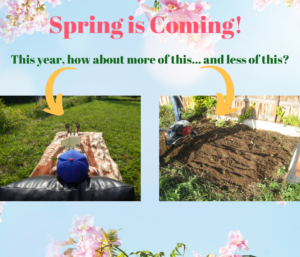Good news! As our spring bulbs begin to awaken, we have new choices for a healthier, more lovely and lively garden this year. We are learning that our gardens, plants, and pollinators need exactly what we thought we were supposed to “clean” every year. Surprisingly, less work for you means more health and vitality for our gardens as well as our environment. Even more encouraging, there are simple steps we can choose this season to increase the number of native bees, butterflies, songbirds, and fireflies at home. This encouraging news can bring a sprightly step to our first forays into our gardens!
LEAVES
The leaves we thought we were supposed to rake and take out from our gardens are actually protecting the bumblebee nests we want for a season of wonderful fruits and flowers! In the areas below our Oaks and Maple trees, a layer of leaves is protecting the chrysalis and cocoons of the butterflies that formed in these host trees’ branches last season. Even more surprising, the leaves we leave will fertilize our gardens with exactly the nutrients that our plants, trees, and shrubs require. Really.
PERENNIALS STEMS
We also thought we were supposed to remove last year’s perennial stalks. But in fact, cutting them instead to varying heights between 12 – 24” creates nesting sites for over 400 species of threatened, native bees. Won’t the stalks look unkempt? No worries, the new leaves, and stems will soon hide the older stalks from all but our important, native pollinators for their two-year, nesting cycle.
MORE MULCH?
Well, bark mulch can contain deadly chemical preservatives from former wood pallets. But a thin, top layer of certified bark mulch can help us transition to this new world of healthier, less resource-intensive garden maintenance. Shredded bark mulch laid too thickly can reduce the amount of rain and oxygen that plant roots need. Be sure also to remove any mulch volcanoes from your trees with care so that no mulch that is touching the bark of a shrub or tree.
SIGNS FOR THE NEIGHBORS
We want to make sure that our neighbors and community know that we are caring for our gardens. The Healthy Yards organization has a terrific list of many signs we can buy or create which communicate that you are also caring for all of the beneficial insects that feed our birds and wildlife.
LANDSCAPE CHEMICALS
Did you know that a mother bird needs 6,000 – 9,000 un-poisoned caterpillars to feed one clutch of babies? This can be your spring-to-break old, destructive, and deadly habit of poisoning the caterpillars and mice that our songbirds, owls, and hawks need to live. It is time to conclusively share our plants’ leaves -be proud of the holes left by the caterpillars our mother birds need to feed their babies. It is time to bring all of our pesticides, herbicides, insecticides, and poisons to your community’s next Household Hazardous Waste disposal day.
QUIT YOUR LAWN
There are so many wonderful, pollinator-supporting, groundcover plant options available instead of the lawns that currently gobble resources and valuable habitat space from the wildlife we love. Not quite ready to let the green carpet go? Consider then, simply reducing its size by creating a 6-8’ deep, flowing, outer ribbon of massed, native shrubs and several native shade trees that frames your now-smaller lawn. You get more privacy while the birds, bunnies, and butterflies thank you for the best food and shelter they’ve had for years.WASPS
Wasps are important pollinators as well. Spraying poisons around our homes, however, is not a smart solution. I have been surprised, however, that a simple, crocheted, decoy “nest” hanging in the corner of, you guessed it, the porch has provided two seasons of a wasp-free porch, porch furniture, porch eaves, and porch light fixtures. The neutral color of this Etsy purchase is a small, aesthetic price to pay for the completely effective “occupied” sign. I hear of, but have not tried, a similar paper version called “Get Lost Wasp”.
PORCH LIGHTS
According to the research done in the Department of Physics at Florida Atlantic University, “Light pollution does not just affect plants’ cycles directly – it also affects them indirectly by interfering with the life cycles of their pollinators or other animals that interact with them.” Fireflies, bees, and birds will benefit from you choosing to instead mount the now easily-available and inexpensive motion detector and solar downlight fixtures for walkways and entrances.
BUG ZAPPERS
Don’t bother replacing or putting out your bug zapper. Recent research has shown that their satisfying zap is killing less than 0.25% of mosquitoes. The other, over 99.75%, they kill are the same beneficial insects that, once again, feed our hungry birds.
FURRY FELINES
Consider keeping fluffy inside this season. Poland has recently declared that household cats are now an invasive species for good reason. Our sweet companions are also highly effective bird killers. “In the United States alone, outdoor cats kill approximately 2.4 billion birds every year.”
At a busy time of year, it’s nice to know that one choice can increase our hearing of bird calls, which has been linked to lasting mental health benefits.
CHOOSE AMERICAN PLANTS OVER BIRD FEEDERS & HOUSES
Choose, this year, to begin to play and experiment with plants that are native to your unique ecoregion. Choose the plants that love to grow in your soil and weather, feeding our wildlife exactly the pollen, nectar, nuts, and berries they need while sheltering their families. The National Wildlife Federation and Audubon both offer lists of plants that support and create habitats for the wildlife we love. Properly sited and established, these plants don’t need the extra watering, special fertilizers, or protections that conventional, non-natives require. Your birds and butterflies will love you even more!
Make this a special spring, a wonderful time for more diverse, efficient choices that provide a sense of ecological ease. May these options bring you a new season of less work, more beauty, more health, and more life in your garden! <3


